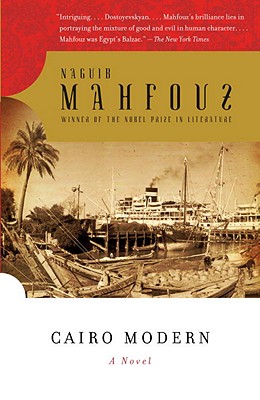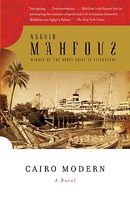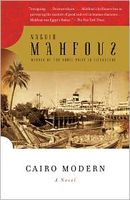- Series
- | Authors
- | Book Release Calendar
- | Search |
- Genres
- | Newsletter
- Welcome to FictionDB, Guest
- | My Account
- | Help

Cairo Modern — Naguib Mahfouz

-
Published:
Dec-2009 -
Formats:
Print / eBook -
Main Genre:
Literary -
Pages:
243 -
Rating:
-
Purchase:
-
Share:
The novelist's camera pans from the dome of King Fuad University (now Cairo University) to students streaming out of the campus, focusing on four students in their twenties, each representing a different trend in Egypt in the 1930s. Finally the camera comes to rest on Mahgub Abd al-Da'im. A scamp, he fancies himself a nihilist, a hedonist, an egotist, but his personal vulnerability is soon revealed by a family crisis back home in al-Qanatir, a dusty, provincial town on the Nile that is also a popular destination for Cairene day-trippers. Mahgub, like many characters in works by Naguib Mahfouz, has a hard time finding the correct setting on his ambition gauge. His emotional life also fluctuates between the extremes of a street girl, who makes her living gathering cigarette butts, and his wealthy cousin Tahiya. Since he thinks that virtue is merely a social construct, how far will our would-be nihilist go in trying to fulfill his unbridled ambitions? What if he discovers that high society is more corrupt and cynical than he is? With a wink back at Goethe's Faust and Henry Fielding's Joseph Andrews, Mahgub becomes a willing collaborator in his own corruption. Published in Arabic in the 1940s, this cautionary morality tale about self-defeating egoism and ill-digested foreign philosophies comes from the same period as one of the writer's bestknown works, Midaq Alley. Both novels are comic and heart-felt indictments not so much of Egyptian society between the world wars as of human nature and our paltry attempts to establish just societies.
Genres
Sub-Genres
Click on any of the links above to see more books like this one.

